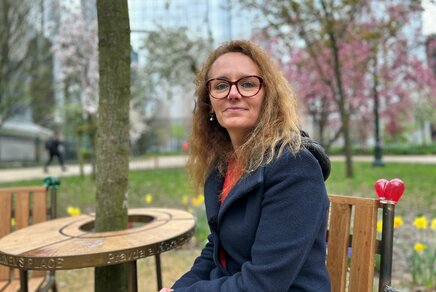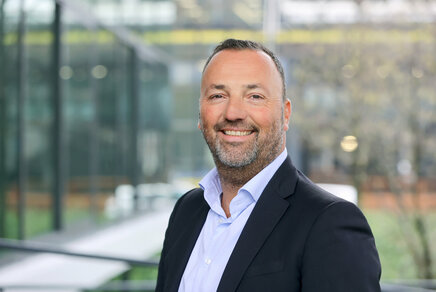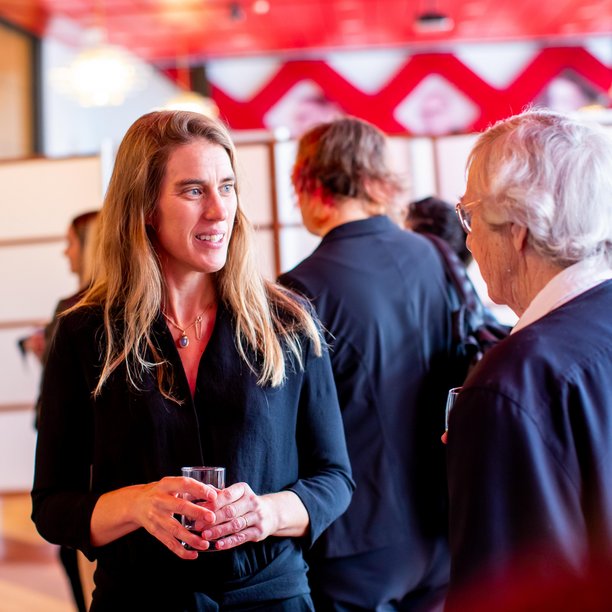“I'm drawn to things that require extra effort”
Just as Formula One is the cradle of innovation in sport, so alumna and entrepreneur Kjille Hoeben sees the broader sporting world as a driver of technical innovation in general. The winner of the Marina van Damme grant dreams of a future in which she is helping startups.
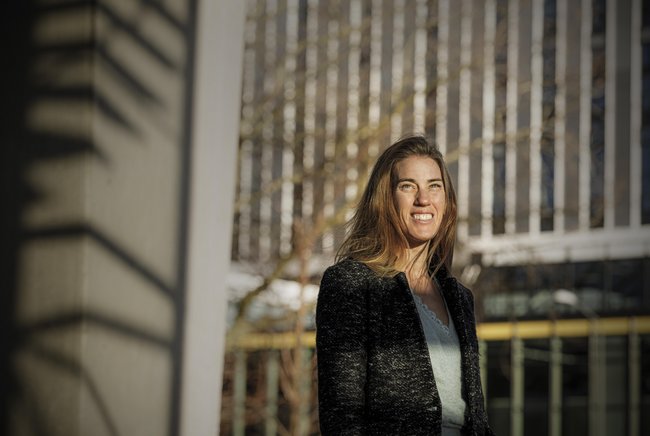
Alumna Kjille Hoeben is constantly maneuvering herself out of her comfort zone. She was doing it while still a TU/e student studying Industrial Engineering and Management Sciences, as she aspired to a career in elite sport, and today this habit is helping her to forge ahead in her work as CEO of start-up myTemp. As always, the common thread running through all she does and takes on is sport.
TU/e International Women's Day
This year’s theme for International Women’s Day is “Pushing the limits for a livable world". How can we bring about a future without climate change, ecological breakdown, pandemics, scarcity, war, discrimination and other threats to a humane and equal living society?
Join us for an inspiring event this Wednesday March 8, with talks and interviews with female TU/e students, staff and alumnae who are working towards a better world.
Kjille Hoeben enters Atlas and is at once struck by how the building - called Hoofdgebouw (Main Building) back when she was studying Industrial Engineering and Management Sciences - has undergone a metamorphosis. “It's so vibrant, it's buzzing with life,” says the alumna, full of admiration.
Her recent contact with the university has made her keenly aware that entrepreneurship is now strongly encouraged among students and employees. “I could have done with that in my time,” says the CEO of startup myTemp. “Back then the focus was on going to work for a big company after you graduated. I wanted to start my own business, be free to make my own choices, and I would have liked to have learned more about that pathway during my student years. I had to discover so much for myself and I've certainly made mistakes, still, they are your best teacher.”
She is keen to share these life lessons picked up en route to running a successful company with TU/e students who are themselves keen to start a business. “I would like to be involved with startups related to sport and technology. I can offer coaching and help them find the right network that will act as a springboard.”
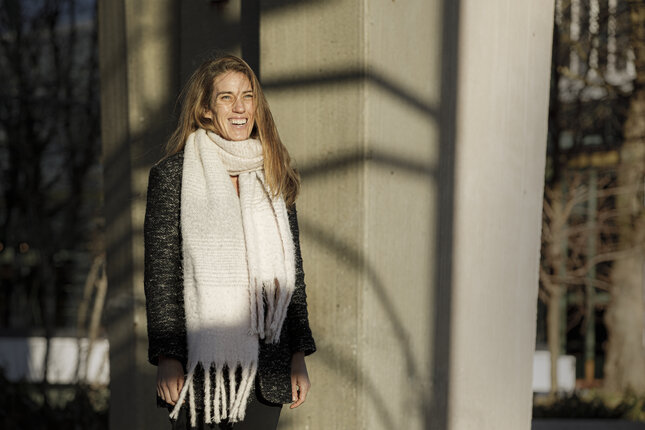
Entrepreneurship
And so, via The Gate, Hoeben has been coupled with a fledgling company set up by a student of Biomedical Engineering. “We're still getting to know each other, but he is a terrifically smart young man with appealing ideas. I am impressed by his drive and how high the standard is here, how much infrastructure there is to support enterprising students. That's a great step forward. I certainly didn't excel in technical and engineering subjects, and I often wondered whether I belonged here. Now I know we also need people who have the ability to build connections and to apply technical knowledge. And that's what I'm good at.”
I think I'm a classic example of someone with imposter syndrome
Alumna Kjille Hoeben
Hoeben doesn't like to beat about the bush. She is open and can be painfully honest and critical about herself. “I think I'm a classic example of someone with imposter syndrome,” she says. This is where successful people put their success down to luck or the right timing, or the fact that others believe them to be smarter than they themselves feel they are. “I'm aware that by thinking this I'm selling myself short; and the glass ceiling is created by me, not by others. I've had so much help from men who have supported me in my career. It is up to me to break the traditional pattern.”
Sports innovation
This help came early on in her career, when she followed up her degree with a position at Brainport, in Sports & Technology. “I was forging links between knowledge institutions, companies and the sporting world. The aim was to use sports innovations to help athletes while also giving the region an economic boost. I'm good at seeing the connections between disciplines and at bringing people together. At Brainport I had good teachers in Hans van Breukelen, Cees van Bladel and later at InnoSportNL George de Jong. I learned so much in those years and met so many people, even now I'm plucking the fruits of that period.”
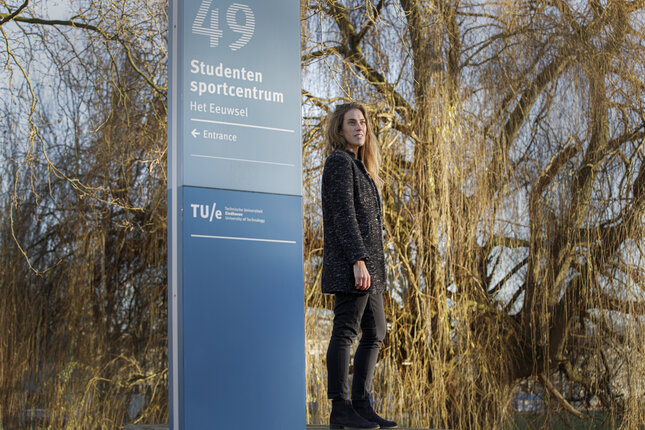
A place in her heart for sport
In her youth Hoeben was heavily asthmatic. The family doctor advised her parents to get their daughter taking plenty of exercise. She started swimming and running. “Turned out I was good at it too!” From then on, sport would become a thread running through her life.
At university she soon joined the Student Sports Centre, where she focused on training for triathlons with Squadra Veloce. An elite sporting career beckoned. Hoeben gave it her all but she didn't quite make the top. “By the time I was ready to graduate I was training at least twenty hours a week: running, swimming, cycling. That is intense, but the challenge is what makes the triathlon and sport in general so appealing to me. Since then I've learned that challenge is what I'm seeking in my work. I'm drawn to things that require just that little bit more effort than treading the familiar path. They offer some kind of adventure, and I like that.”
You have to pass up a great deal if you want to have your own company
Alumna Kjille Hoeben
Her career is clearly somewhere that Hoeben seeks adventure: she owns two companies, both with strong ties to the sporting world. With the income from her agency in sports equipment, she earns enough to work on myTemp. “Having your own company is anything but a nine-to-five job, and you'll have to pass up a great deal in order to make a success of your business. The success of a startup depends on the effort people invest in it, combined with some luck and a network. The latter is so important; you have to know the right people who can help you, advise you and support you.”
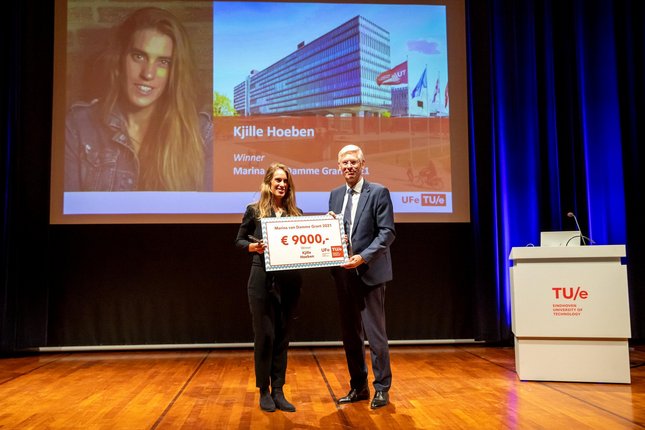
Exit comfort zone
Last October Hoeben won the Marina van Damme grant, intended for talented women alumni of one of the three TUs in the Netherlands. With the grant of nine thousand euros, Hoeben will be working on her management role as CEO of myTemp. The business is now entering the upscaling and production phase, and a merger is imminent. “I am someone who likes to work collaboratively, but now has to learn how to manage a big company. In one-to-one discussions I have no lack of self-confidence, but if we want to move ahead, I'll have to become the face of my company on a larger stage. A coach is going to help me with that. To take that step up, I have to leave my comfort zone.”
myTemp
An acquaintance with Professor Maria Hopman of Radboud University, arising from an innovation project, sparked the birth of startup myTemp. Professor Hopman was looking for a good way to continuously monitor the core temperature of participants in the Nijmeegse Vierdaagse, an annual four-day walking event. This became an issue after a year in which participants died of heat stroke. “She was using a sensor encased in a capsule that could be swallowed. She was getting readouts at the start and finish but she wanted to be able to monitor body temperature continuously, just as a pulse monitor does. She and I searched for technicians to develop such a tool.” Hoeben found these technicians in Clemens Neervoort and Rutger Stoots, and together they founded myTemp in 2014.
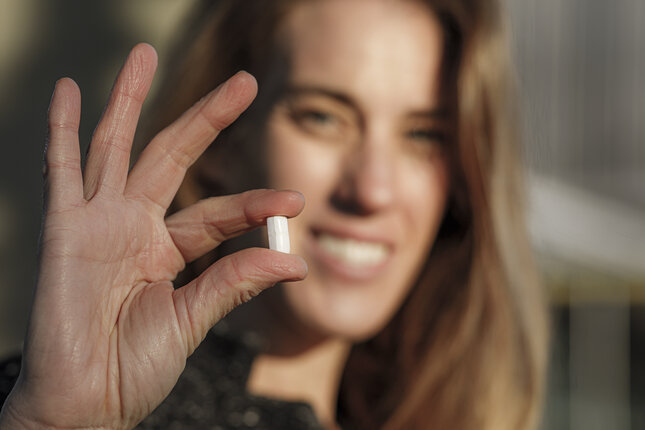
Swallow, monitor and vacate
The product is a capsule that you swallow three hours before an activity. The sensor is able to continuously measure the athlete's core temperature, without any need of a battery. The sensor is repeatedly activated by a magnetic belt worn around the athlete's waist. The athlete's temperature is monitored via an app or computer.
When an athlete's body is working hard, their effort actually triggers a fever. This rise in temperature must not be excessive. myTemp ambassador Joost Fonville knows this only too well. His son Arthur Fonville died of heat stroke during the Netherlands' largest annual running event, the Dam tot Damloop, in 2014. “Joost is passionate about preventing runners from getting heat stroke and about getting more knowledge about this problem out there,” says Hoeben.
As it needs no battery, the capsule could simply go on working indefinitely. However, it passes through the body after a period of time. “Which is actually a shame,” says Hoeben. “In the best-case scenario it would stay put forever. This is still a long way off, but Hoeben is considering ways of implanting the capsule so that the body's temperature can be measured continuously, for people with certain diseases or who are sensitive to fluctuations in temperature.
Industrial application
Prospects of an industrial application are also on the cards. “Think of the food industry, where food has to be produced within a certain temperature range. If you use our capsule, and in this case batteries could be used, continuous monitoring of the production process becomes possible and you can avoid ever having to throw away a whole batch because random sampling suggests that something went wrong somewhere along the line.”
Like Formula One, the sporting world drives innovation
Alumna Kjille Hoeben
Hoeben realizes that industrial applications are a more lucrative option than the sporting world, where elite athletes and research institutes are her main clients. “However enjoyable sport is - and it's still my passion - industry offers greater market potential. But I don't want to turn my back on sport, in part because it's a great advertisement for our product. Like Formula One, the sporting world drives innovation. Demand for an innovative solution often comes from the sporting world and from there it trickles down to the rest of society.”
Hoeben is proud of the projects she has already completed with myTemp. For example, in the run-up to Tokyo, the Dutch Olympic team used the capsule in the climate chambers at Papendal. “We were asked whether we could advise the athletes individually on how best to prepare for the heat in Tokyo. How they could adapt and how they could cool down, to prevent heat stroke. Although I didn’t become an elite athlete, through my work I aim to help other athletes improve their performance. That’s what I’m passionate about doing. And thanks to my technical background I can combine this perfectly with myTemp.”
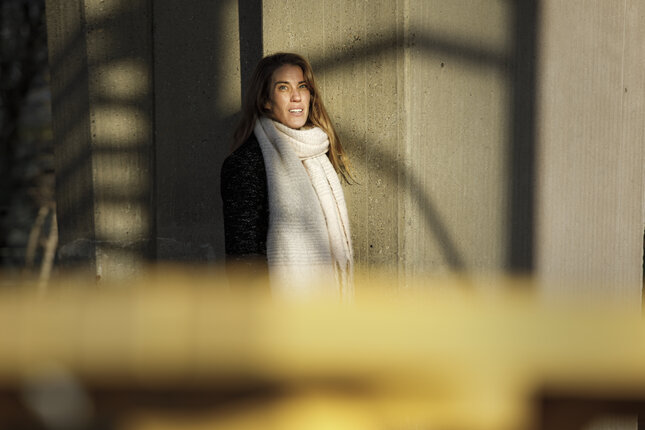
Dreams
“Running my company is a full-time job. I own another company that keeps me afloat financially; we aren't yet earning enough with myTemp, although we have secured plenty of grants over the years.” But Hoeben believes there comes a time when you have to move beyond that funding stream: “Grants are good for getting started, but if your business doesn't become self-supporting, you have to let it fold.”
Hoeben has found investors who are helping her develop the business, both financially and in terms of its organization. “They are encouraging me to take steps as the CEO, to develop in that role. Leaving my comfort zone is something I'm doing increasingly often.”
myTemp will soon be merging with another company in Nijmegen and steps will be taken to pursue the capsule's industrial application. “After the amalgamation we'll have more staff and more financial resources, and that will give me a little more time to work on myTemp.”
Her plan for the next four years is to make a success of the company and then stop. Stop? “I don't see myself as someone who spends years heading up a company. Once it's going well my role will end; there won't be that many challenges anymore. I still have so many ideas I want to work on. My biggest dream of all is that myTemp runs so smoothly in future that, just like my investors, I can help fledgling entrepreneurs and can invest in their ideas.”
More on our strategy
